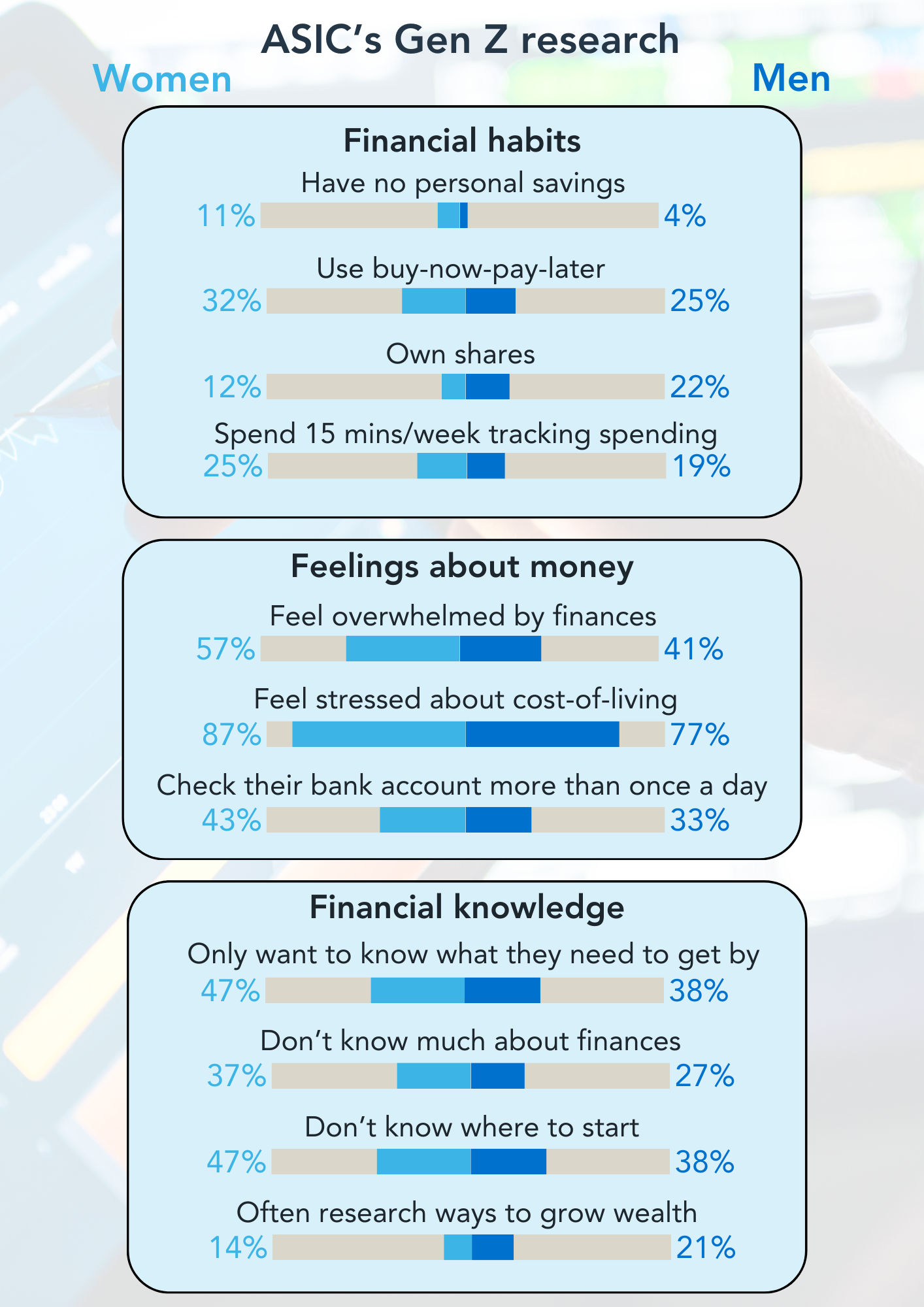New research released by ASIC’s Moneysmart has shed light on the financial concerns of Australian Gen Z women, revealing that they are more likely than Gen Z men to feel stressed and overwhelmed by finances and money.
Moneysmart’s research shows that Gen Z women are:
- more likely than Gen Z men to be severely stressed about the cost of living (87% to 77%)
- more likely than Gen Z men to feel overwhelmed by finances (57% compared to 41%)
- less likely than Gen Z men to research ways to grow their wealth (14% compared to 21%)
- more likely than Gen Z men to have no personal savings (11% compared to 4%) and
- more likely than Gen Z men to use buy-now-pay-later services (32% compared to 25%).
ASIC’s Acting Senior Executive Leader of Corporate Finance, Amanda Zeller, said that the personal finance gender gap between young Australians was in line with international data.
“Moneysmart’s findings are in line with research coming out of organisations such as the OECD, which shows that women are less confident and knowledgeable with money than their male peers,” said Ms Zeller.
“This is an issue further exacerbated by harmful stereotypes about young women and money, perpetuating a cycle of financial anxiety and insecurity among women. It's an issue we need to tackle, because the emerging picture is bleak: The financial decisions young women make today will compound across their lifetimes.”
The new girl math: changing the equation on women and money
One of the biggest social media trends of last year, girl math is when a $300 bag actually costs you a dollar because you plan to use it every day of the year. Or where Taylor Swift tickets are almost free because you buy them six months out from the concert.
While girl math is sometimes rooted in legitimate economic concepts such as cost-per-wear and sunk costs, this acrobatic way of rationalising spending is not adding up to financial security for young women.
“These findings demonstrate the importance of empowering young women to move past girl math and take control of their finances. Countless studies have shown financially literate people are better at budgeting and saving, managing mortgages and debt, planning for retirement, and growing their wealth. These behaviours aren’t inherent – they can be learnt at any age. That’s why we need to change the equation on girl math in 2024,” said Ms Zeller.
ASIC’s Moneysmart offers a range of tools and resources aimed at empowering women to make informed financial decisions. From budgeting and saving tips to investment strategies and superannuation advice, Moneysmart provides a roadmap to financial independence and security.
Some key tips for women to overcome the glass ceiling of ‘girl math’ include:
- Track Your Spending: Gain insight into your expenses and spending habits to identify areas for saving.
- Automate Your Savings: Set up automatic transfers from your paycheck to your savings account to build savings effortlessly.
- Round-Up Your Transactions: Utilise savings accounts or apps that round up your daily transactions to the nearest dollar, directing the spare change into savings.
"Instead of stereotyping, let's encourage women to make every dollar count,” said Ms Zeller.
For more tips and resources, visit Moneysmart.
ASIC's Gen Z research
ASIC's Gen Z research - text version
Financial habits
- 11% of women have no personal savings
- 4% of men have no personal savings
- 32% of women use buy-now-pay-later
- 25% of men use buy-now-pay-later
- 12% of women own shares
- 22% of men own shares
- 25% of women spend 15 minutes per week tracking spending
- 19% of men spend 15 minutes per week tracking spending
Feelings about money
- 57% of women feel overwhelmed by finances
- 41% of men feel overwhelmed by finances
- 87% of women feel stressed about cost-of-living
- 77% of men feel stressed about cost-of-living
- 43% of women check their bank account more than once a day
- 33% of men check their bank account more than once a day
Financial knowledge
- 47% of women only want to know what they need to get by
- 38% of men only want to know what they need to get by
- 37% of women don't know much about finances
- 27% of men don't know much about finances
- 47% of women don't know where to start
- 38% of men don't know where to start
- 14% of women often research ways to grow wealth
- 21% of men often research ways to grow wealth
Background
ASIC’s Moneysmart program helps Australian investors and consumers by providing free and independent financial information and tools. Almost 10 million Australians visit the Moneysmart website each year. Moneysmart is recognised as a trusted source of independent information for consumers and investors.
Research methodology
ASIC via YouGov surveyed 1,016 Australians aged 18 to 26 years (Gen Z) and 1,121 Australians aged 27 and older from 5 to 18 October 2023 to understand their financial attitudes and behaviours. The surveys were carried out online. The figures for each survey have been weighted and are representative of their respective cohort.
